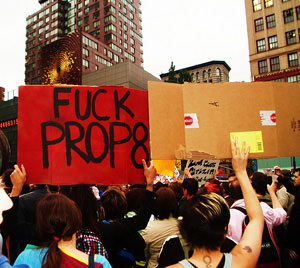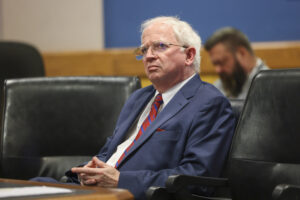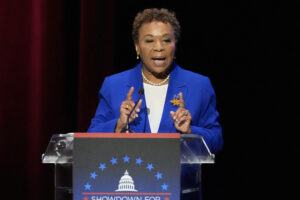Federal Judge Says Gays Have a Right to Marry
Federal Judge Vaughn R. Walker on Wednesday found California's ban on gay marriage unconstitutional. In his decision, the George H.W. Bush appointee wrote: "Proposition 8 both unconstitutionally burdens the exercise of the fundamental right to marry and creates an irrational classification on the basis of sexual orientation." (continued)
Federal Judge Vaughn R. Walker on Wednesday found California’s ban on gay marriage unconstitutional. In his decision, the George H.W. Bush appointee wrote: “Proposition 8 both unconstitutionally burdens the exercise of the fundamental right to marry and creates an irrational classification on the basis of sexual orientation.”
The immediate impact of Judge Walker’s decision appears limited to California, although there are national implications.
Ted Olson and David Boies, one-time rivals in the Bush v. Gore case, went to trial as allies in challenging Prop. 8 with a clear eye on the U.S. Supreme Court, but they still have to make their way through the appeals process.
Incidentally, if the Supreme Court ends up deciding the question of same-sex marriage based on this case, then the historic decision will keep the name Perry v. Schwarzenegger.
Here’s an important chunk from the judge’s decision (the full decision is embedded below):
Plaintiffs seek to have the state recognize their committed relationships, and plaintiffs’ relationships are consistent with the core of the history, tradition and practice of marriage in the United States. Perry and Stier seek to be spouses; they seek the mutual obligation and honor that attend marriage, FF52. Zarrillo and Katami seek recognition from the state that their union is “a coming together for better or for worse, hopefully enduring, and intimate to the degree of being sacred.” Griswold, 381 US at 486. Plaintiffs’ unions encompass the historical purpose and form of marriage. Only the plaintiffs’ genders relative to one another prevent California from giving their relationships due recognition.
Plaintiffs do not seek recognition of a new right. To characterize plaintiffs’ objective as “the right to same-sex marriage” would suggest that plaintiffs seek something different from what opposite-sex couples across the state enjoy — namely, marriage. Rather, plaintiffs ask California to recognize their relationships for what they are: marriages.
Essentially, people have a fundamental right to marry, and Prop. 8 denies that right on the basis of gender. The law is much more concerned with gender discrimination than sexual orientation discrimination — by orders of magnitude — so it’s a boon to same-sex marriage advocates that the judge accepts and supports this view in his decision.
Actually, Walker goes even further in places. The judge wrote, essentially, that even if he found gays to be in the least protected class of people where discrimination is concerned, Prop. 8 doesn’t work. But he thinks gays actually belong in the most protected class. — PZS
Your support matters…Los Angeles Times:
U.S. District Chief Judge Vaughn R. Walker said Proposition 8, passed by voters in November 2008, violated the federal constitutional rights of gays and lesbians to marry the partners of their choice.. His ruling is expected to be appealed to the U.S. 9th Circuit Court of Appeals and then up to the U.S. Supreme Court.
“Plaintiffs challenge Proposition 8 under the Due Process and Equal Protection Clauses of the Fourteenth Amendment,” the judge wrote. “Each challenge is independently meritorious, as Proposition 8 both unconstitutionally burdens the exercise of the fundamental right to marry and creates an irrational classification on the basis of sexual orientation.”
Independent journalism is under threat and overshadowed by heavily funded mainstream media.
You can help level the playing field. Become a member.
Your tax-deductible contribution keeps us digging beneath the headlines to give you thought-provoking, investigative reporting and analysis that unearths what's really happening- without compromise.
Give today to support our courageous, independent journalists.






You need to be a supporter to comment.
There are currently no responses to this article.
Be the first to respond.